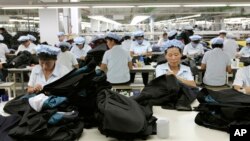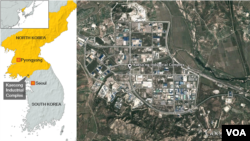South Korea said Monday it will limit its citizens' stay at the inter-Korean industrial complex in the North Korean border city of Kaesong, in response to Pyongyang's latest suspected nuclear test.
The measure follows last week's move limiting South Koreans' entry to the complex.
South Korea's Unification Ministry spokesman Jeong Joon-hee told reporters his government will limit the number of South Koreans staying overnight at the facility to the minimum level required to run the operation at the complex, where about 53,000 North Koreans are working at about 120 factories run by South Korean companies.
"This is part of our efforts to strengthen the protection of our citizens in anticipation of possible actions by North Korea in response to the resumption of loudspeaker broadcasts," Jeong said during a press briefing, in reference to Seoul's resumption of loudspeaker propaganda broadcasts across the demilitarized zone.
Minimum staff allowed
The new measure taking effect Tuesday bans South Korean food vendors at the complex from staying overnight there, which would reduce the number of South Koreans staying overnight at the complex to about 650. Currently, about 800 South Koreans are staying overnight at the complex each day.
Yoo Chang-keun, vice chairman of South Korea's Kaesong Industrial Complex Business Association, told VOA the move will affect its production.
"They are already operating with the minimum number of staff. They may have no option but to cut production," Yoo said.
On Monday, South Korea's Defense Ministry said Pyongyang has expanded its own loudspeaker broadcasts against Seoul. Citing a military source, South Korea's Yonhap News Agency reported Saturday that the communist country had started the propaganda broadcasts. The content includes messages glorifying Kim Jong Un and attacking South Korean President Park Geun-hye. The broadcasts appeared to be too weak to hear clearly on the South Korean side, according to the ministry.
Last week, South Korea took a series of steps in a retaliatory move against North Korea, saying the nuclear test violated an inter-Korean agreement reached in August. The deal calls for easing tensions on the Korean peninsula and promoting dialogue and exchanges between the two sides.
VOA’s Jee Abbey Lee contributed to this report.





